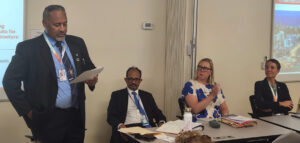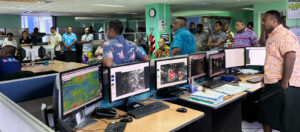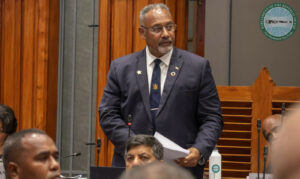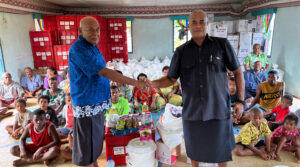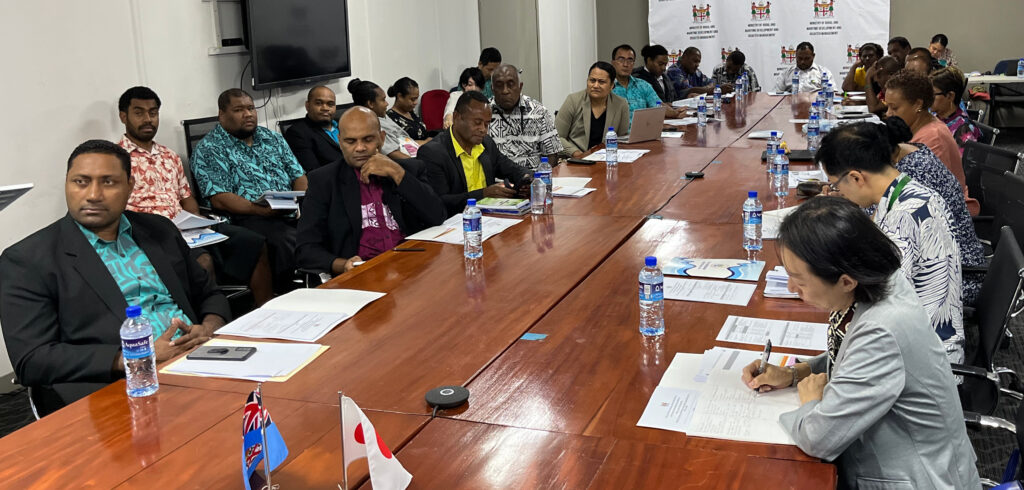
Caption: Deputy Secretary for Rural and Maritime Development and Disaster Management, Mr. Mitieli Cama (far left) and members of the Ministry’s senior management with representatives from the Japan International Cooperation Agency (JICA), the National Disaster Management Office (NDMO), and the various Government ministries during the joint coordination meeting in Suva in June.
SUVA – Government ministries must take the threatof climate change and disasters seriously, and ensure that measures to reduce disaster risks are integrated in development initiatives carried out by Government.
This was emphasised by the Deputy Secretary for Rural and Maritime Development and Disaster Management, Mr. Mitieli Cama during a joint coordination meeting for the JICA Mainstreaming Disaster Risk Reduction (DRR) Project in Suva last June.
Mr Cama highlighted that as the effects of climate change became more evident in the near future, it must be expected that natural hazards would become more frequent and more severe in intensity.
This, he said meant increased damaging impacts to the economy and on our people, “if we don’t take the required mitigating actions now”.
“We cannot be adopting a business as usual approach to the way we do things as we witnessing daily the very real changes to weather patterns, and the frequent and damaging impacts of disasters that are now happening,” Mr Cama highlighted.
“We need to be risk informing our development planning processes and we should be considering the potential impacts of climate change and disasters in every investment decision.”
The JICA Mainstreaming DRR Project focuses on scientifically assessing the risks that we face from our most destructive hazards, namely floods, earthquakes, storm surges, earthquakes and tsunamis.
The Project also looks at formulating local DRR plans that will guide the incorporation of DRR into divisional, urban and rural development plans.
“This must be the way forward for development in the country.”
Mr Cama stated that the Ministry of Rural and Maritime Development and Disaster Management have started work in this area.
The Ministry is partnering with the United Nations Development Programme’s (UNDP) Governance for Resilient (Gov4Res) Development Project, to fund disaster and climate change mitigation into all our projects and programmes.
“We are also actively liaising with all of you in the implementation of the National Disaster Risk Reduction Policy (NDRRP), which provides a guideline for the mainstreaming disaster risk reduction across Government. Output 3 of this Project is linked to the NDRRP and provides a roadmap for the implementation of the NDRRP activities,” Mr Cama added.
“We have also taken steps to rope in the private sector, academia and civil society to work together with Government in promoting a whole of society approach to DRR, so we can pool together our collective expertise and resources in building a safer country for our children.”
“The National Disaster Management Office is leading the coordination of the mainstreaming of disaster risk reduction across sectors and we count on you to work with us in spreading the message of DRR into your respective Ministries and communities.”
-ENDS-
The Ministry of Rural and Maritime Development and Disaster Management is responsible for implementing development strategies that bring Fijians living in rural and maritime regions the same level of access to essential services and economic opportunities as anywhere else in the country. We coordinate and implement the Fiji Government’s rural and maritime development initiatives with a mission to empower Fiji’s rural sector. We also spearhead disaster risk reduction initiatives at national and sub-national level including disaster preparedness, response, and recovery. We have offices for each of Fiji’s 14 provinces including Rotuma, leading the Fiji Government’s rural development and disaster risk management operations.
Follow us on Twitter @MRMDFiji @FijiNDMO| Facebook: @developmentfiji
For press enquiries: Aqela Susu, MRMDDM, Tel. +679 3216456/+679 9985670,


